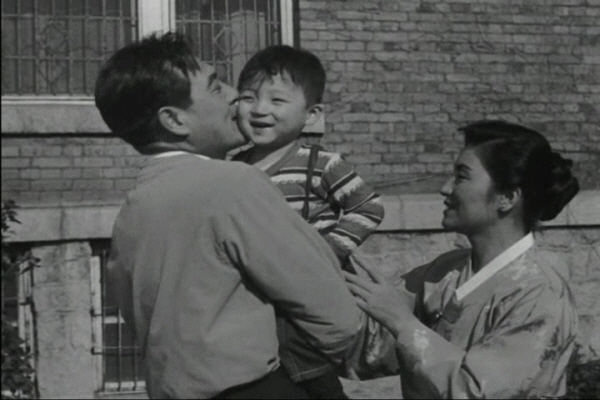[HanCinema's Film Review] "It's Not Her Sin" + Full Movie
 By Panos Kotzathanasis | Published on
By Panos Kotzathanasis | Published on
It was a real pleasure watching Shin Sang-ok finally straying away from his usual melodramatic tropes, to deal with a different kind of film, a crime one. And although the narrative is anything but stripped of melodrama, the unique approach of Korean cinema towards this kind of movies, which focuses not on whodunit but whydunit, truly shines here.
Advertisement
The story starts in the most impressive way possible, as we watch Seong-hee, wife of diplomat Baek Sang-ho confronting Yeong-sook, trying to prevent her from ascending the stairs of the building they are standing in. She fails, but before the latter has the chance to enter the door, Seong-hee shoots her, although not mortally.
The next scenes see the prosecutor that is handling the case interrogating the perpetrator, her husband and Yeong-sook's boyfriend. The prosecutor thinks this is a case of a love triangle, and Seong-hee has been having an affair with Yeong-sook's boyfriend. Unfortunately, both the papers, who follow the case due to the involvement of a diplomat, and Sang-ho himself believe the prosecutor initially, with the latter threatening to divorce his wife. A bit later, however, and as Seong-hee visits Yeong-sook in the hospital, the latter forgives her, intensifying the mystery of why the attack occurred. Furthermore, and in an effort to protect her assaulter, Yeong-sook meets with the prosecutor and Sang-ho to explain the whole story.
The movie then flashbacks to the past, when a younger Yeong-sook dated a rather awful man, who left her impregnated, and the help Seong-hee offered her in a number of ways including adopting her as a sister, and the terrible deal the two women stroke.
The main premise of "It's Not Her Sin" is, once more in a Shin Sang-ok film, melodramatic, but at the same time, not overly excessive regarding the way the story unfolds. Furthermore, the social comments about the place of women in society, as slaves to the whims of men, their role as child-bearers and the social outcry of birth out of wedlock are all eloquently presented, while adding much to the general story the movie revolves around. That the focus is on women instead of men is quite evident from the initial scene, since a woman shooting another woman was anything but a common theme for Korean cinema (not even now I daresay, at least not in social dramas). At the same time, that the men are the ones who all dolled-up here and the ones essentially having secondary roles, also adds to the female focus.
Furthermore, Shin creates an excellent antithesis between the two women that works on a number of levels, starting with the fact that Seong-hee is always in traditional attire and Yeong-sook in western clothes, but cemented by the fact that one is unwillingly pregnant and the other unable to bare children. The concept may seem somewhat preterit, but the way Shin implements it into the narrative is exceptional, with its gradual reveal eventually allowing the viewer to realize that everything derives from that concept, as the notion of motherhood also comes to the fore.
With such a narrative, the burden of the quality of the film fell on the two protagonists, but Choi Eun-hee as Yeong-sook and Ju Jeung-ryu as Seong-hee give wonderful performances, in rather difficult roles that have them both exhibiting a plethora of different feelings and psychological statuses with equal artistry. Furthermore, their chemistry is one of the best parts of the movie. The third most memorable performance comes from Park Gyeong-ju as the prosecutor, whose misplaced notion of what has happened is injected with significant contextual meaning about how men perceived women at the time. Jeon Taek-yi as Yeong-sook's ex-boyfriend is a great (and essentially the only) villain in the title, while the two men are also the main representatives of the noir element here.
Jeong Hae-jun and Choi Gyeong-ok's cinematography is also top-notch, with them portraying the number of different settings with realism, while highlighting both the melodramatic and the noir/crime aspects of the narrative artfully. Kim Young-hee-II's editing implements a pace that adjusts to the aforementioned elements, slower in the melodramatic and faster in the crime/noir ones, that suits the general aesthetics nicely, while at 104 minutes, the movie does not overextend its welcome in any way.
Featuring great acting, direction and script (based on a novel by Austrian Gina Kaus), "It's Not Her Sin" emerges as one of the best works Shin Sang-ok produced in the 50s.
Review by Panos Kotzathanasis
___________
"It's Not Her Sin" is directed by Shin Sang-ok, and features Choi Eun-hee, Ju Jeung-ryu, No Neung-geol, Lee Min, Jeon Taek-yi, Park Gyeong-ju. Release date in Korea: 1959/01/14.
 Panos Kotzathanasis
Panos Kotzathanasis
Panos Kotzathanasis is a film critic and reviewer specialising in East Asian Cinema. He is the founder of Asian Film Vault, administrator of Asian Movie Pulse and also writes for Taste of Cinema, Eastern Kicks, China Policy Institute and Filmboy. You can follow him on Twitter and Facebook. Panos Kotzathanasis can be contacted via sinkazama82@gmail.com.


